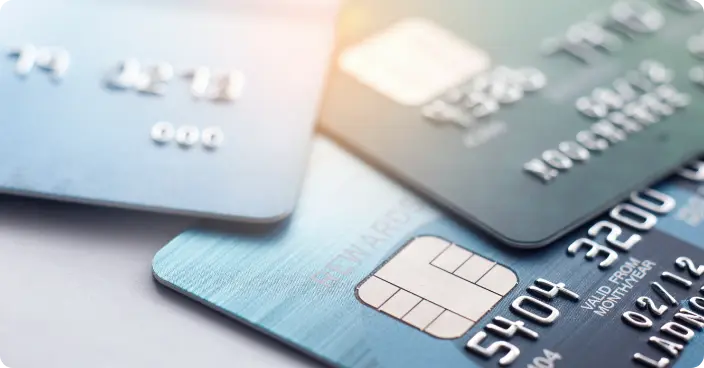An unsecured debt is a loan that doesn’t require an asset as collateral to borrow.
Types of unsecured debt include credit card debt, utility bills and any other type of bill that isn’t associated with any asset.
In this guide we’ll examine unsecured loans, including what they are, what the difference is between secured and unsecured debt, why it’s important to clear your outstanding loan balance, and where to get support if you’re struggling with monthly payments.
Contents
Are there different categories of unsecured loans?
Unsecured debts fall into two categories: consumer and non-consumer. It’s important to be aware of the differences and understand what debts can fall into each category when considering your repayment options.
Consumer debt
Any unsecured debt can fall into this category with a minor number of exceptions which are classed as non-consumer debts.
Unsecured consumer debts include:
Credit cards
Cards provided by credit card companies that allow you to borrow money (in the form of credit) and make purchases. The idea is that you then pay back your credit card balances each month.
Non-consumer debt
This includes money owed to the government as well as obligations from court-ordered child or spousal support.
Unsecured non-consumer debts include:
Business loans
Short-term or long-term financing options for small businesses used to cover expenses, fund growth, and other use. They’re given out by banks, credit unions, alternative lenders, and peer-to-peer lending companies.
Personal loans
Unsecured personal loans are short-term or long-term financing options for individuals used to cover general expenses, from a personal loan to fund a home improvement project, to a loan that will pay for a wedding.
Which should I prioritize from secured and unsecured debt?
Knowing which debts to prioritize can often be easier said than done but the reality is people tend to make more of an effort to repay secured debts, so they aren’t at risk of losing assets such as their homes.
As there is no collateral attached to unsecured debts they are considered to be more of a risk to the lender and consequently often have a higher interest rate which can take longer to pay and increases the financial burden – especially if you default on payments.
What happens if I fail to repay an unsecured creditor?
Unsecured creditors will often recruit debt collection agencies to follow-up and coax you into paying the outstanding debt you owe.
Wage garnish
Lenders could a legal approach by suing and asking the court to garnish your wages until payment has been collected in full.
Lien
Although creditors can’t automatically repossess assets, they could apply to the court to have a lien placed on your real property and in turn become a secured creditor. Real property includes assets such as domestic and rental properties as well as farmland and commercial real estate.
Damage to credit history
Creditors can also report any payment status to credit bureaus to be reflected on your credit report.
What’s the difference between secured debt and unsecured debt?
Understanding the distinction between debt types is crucial when searching for help with debt to find the solution that is best suited to your needs.
Unsecured debt is the most common debt type in Canada with millions of Canadians struggling to manage payments every month – as industry figures reveal that three in 10 don’t make enough to cover their debt and debt obligations.
What are some common examples of an unsecured loan?
Debts to credit card companies
This is the most widely held unsecured debt in Canada and industry figures show only 25% of people pay off their balance in full every month. Credit cards are undeniably a valuable financial tool when faced with unexpected bills such as home repairs or medical bills. However, if you find yourself flashing the plastic to cover the cost of every day life, debts can quickly build and begin to become unmanageable.
Payday loans
Many people who turn to payday loans for financial support typically are already finding it hard to manage their money and a payday loan can expedite further issues.
Medical bills
Medical debt may be a sensitive issue but it’s something that people all over the country are faced with as they manage payments for prescriptions, some procedures and supplies.
Utility bills
There is no escaping the fact that everyone must find the money to cover utilities such as gas, electricity and water but accruing debts from utility bills is easier than you might think. From something as simple as misplacing a bill to facing unexpected utility bill price rises it’s a problem faced by many Canadians.
Student debt
For many people, a student loan could be the difference between being able to enter higher education or not. However, there’s often a misconception amongst students that they have more dispensable cash than they really do which is where dipping into student loans can cause a problem.
Where can I get debt advice and support to deal with unsecured debt?
Nobody willingly takes on debt they know they’ll be unable to pay back, however, life can change in an instant and a debt that was once manageable can suddenly become a struggle.
If you find yourself struggling with debt, support is available to help manage, consolidate and even write off debt.
Farber Debt Solutions is proud to offer a range of debt relief options to help you regain control of your debts, no matter how big, and join you on your journey to a debt free future.
To get free debt advice and financial guidance, talk to one of our friendly debt experts today on 877-375-6558 to find support.



